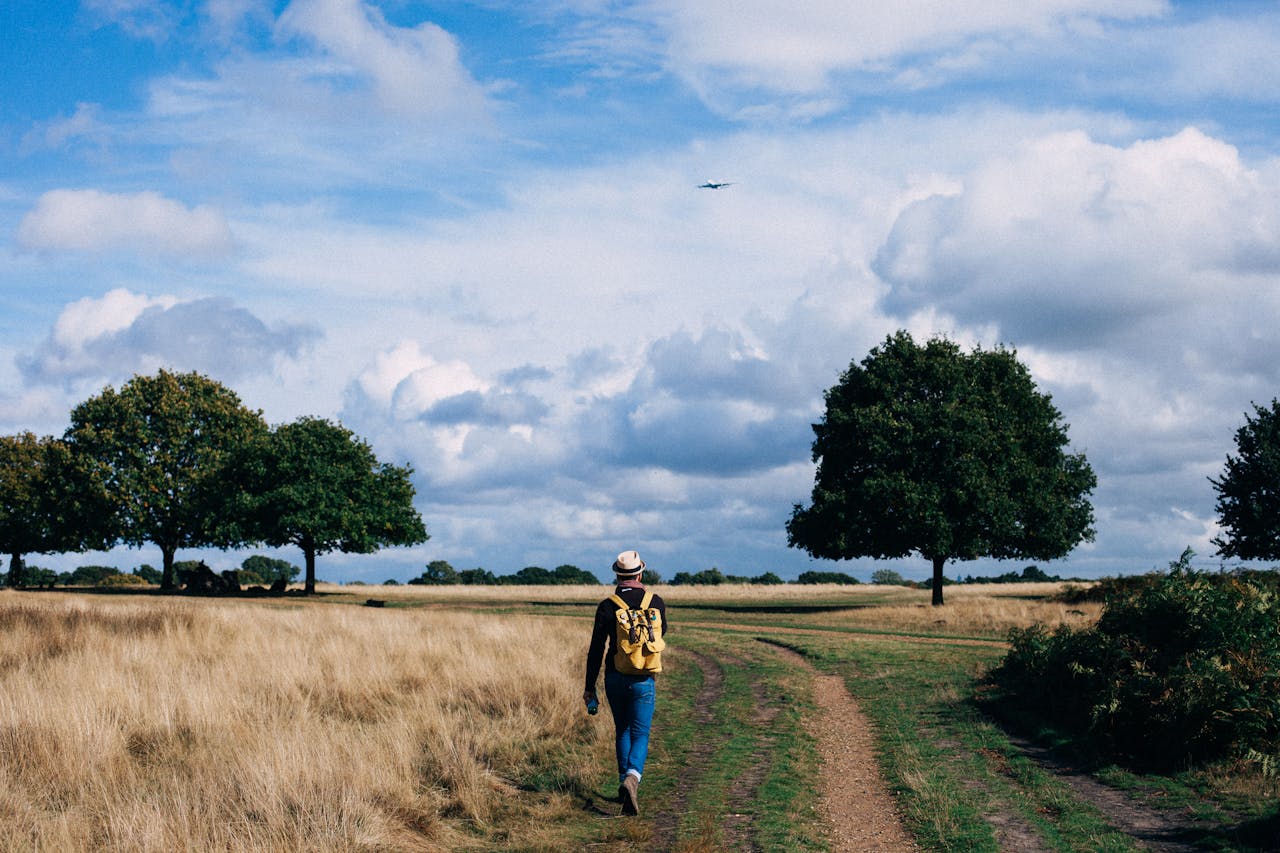How Long Does It Take To Walk 20 Miles?
The question of 'how long does it take to walk 20 miles' is a common inquiry among individuals seeking to plan their journeys on foot. The duration it takes to cover the distance of 20 miles by walking depends on various factors, such as one's walking pace, terrain, and personal fitness level.
Author:Suleman ShahReviewer:Han JuFeb 20, 2024858 Shares107.2K Views

One of the most economical, healthiest, and beneficial types of exercise is walking, which has several advantages for your body. It's a great kind of exercise for individuals of all ages and fitness levels since it's simple to include in your daily schedule. You will learn how long does it take to walk 20 milesand get answers to the most common inquiries in this article.
Since the typical individual needs around five hours to six hours and forty minutes to walk twenty miles, the average walking pace is approximately three miles per hour. The ultimate time will depend on several variables, including topography, age, gender, and degree of fitness.
Your walking pace will determine how long it takes you to cover 20 kilometers. Walking two or three miles in a row is not the same as walking twenty kilometers.
Strolling Pace For Walking 20 Miles - 10 Hours
Generally speaking, a strolling speed is less than two mph or around thirty minutes per US mile; this might occur whether you're taking your dog for a stroll or going for a stroll. Walking a mile at this speed will take you thirty minutes. The majority of those walking do it at a rather leisurely pace. It would take 10 to 11 hours to walk 20 miles at a leisurely speed or 2 miles per hour.
Striding Pace For Walking 20 Miles - 6.6 Hours
About 3 miles per hour would be the striding speed for 20 miles per hour. If they walked 20 miles at the current pace of 3 miles per hour, most individuals would finish the distance in 6.6 hours or less. You would be walking a mile at the striding speed in twenty minutes.
Once again, the majority of people would have to make stops for water, rest, or bathroom breaks, thus finishing twenty kilometers may take you 6.6 to 7.5 hours.
Brisk Pace For Walking 20 Miles - 5.7 Hours
The rapid speed would be seen as more important than 3.5 miles per hour. It would need 5.7 to 6.7 hours to complete. You would be walking a mile at this speed in seventeen minutes. You may cut an hour off the time it takes to walk 20 miles by boosting your walking pace to 17 minutes per mile.
Fast Pace For Walking 20 Miles - 3.3 Hours
You may attempt walking at a pace of around six miles per hour if you'd like to stroll quickly. Walking a mile at a pace of six miles per hour would take you ten minutes. Some may choose to walk or run to reach the 10-minute-per-mile pace. At such a rate, walking twenty miles may take them three to four hours.
Calories Burned From Walking 20 Miles
It might be beneficial for you to know how many calories you burn while walking 20 kilometers, so you should be aware of this. A 20-mile walk's calorie burn depends greatly on several variables, such as your weight, walking speed, and topography.
A person weighing between 155 and 160 pounds (70 and 73 kg) on average can walk 20 miles and burn around 3140 - 4190 calories. The amount of calories you burn when walking will vary greatly depending on your speed. Take a peek below if you're wondering how many calories you can burn in a mile.
- You may burn between 157 and 209 calories each mile if you move slowly.
- About 183-244 calories might be burned each mile at a moderate walking speed.
- A mile of vigorous walking may burn between 210 and 279 calories.
- You may burn 236-314 calories per mile walking at a fast speed.
Side Effects Of Walking 20 Miles
Depending on your fitness level, your health, and the environment you are walking in, walking 20 miles may have both beneficial and bad consequences on your body. The following are a few possible negative consequences of walking 20 miles:
Muscle Soreness
Muscle tension may occur after walking 20 kilometers, particularly if you're not accustomed to walking lengthy distances. Weariness, stiffness, and soreness in the muscles may result from this.
Joint Pain
Long walks may also put stress on your joints, particularly the ankles, hips, and knees. This might cause harm or even joint discomfort if you're not cautious.
Blisters And Calluses
Prolonged walking may lead to calluses and blisters from the contact between your feet and your shoes.
Dehydration
Walking for 20 kilometers may result in significant fluid loss via perspiration; if you don't consume enough water and electrolytes, you risk becoming dehydrated.
Exhaustion
It might be physically and psychologically draining to walk 20 miles, particularly if you're not accustomed to it. Fatigue, headaches, and trouble focusing might result from this.
It's crucial to pay attention to your body and take rests while walking lengthy distances. Seeking medical advice from a specialist is always a good option if you are experiencing significant pain or discomfort.
Avoid Side Effects Of Walking 20 Miles
There are several ways to reduce or eliminate the negative consequences of walking 20 miles:
- Make a plan for your walk and consult the weather forecast. Make sure your route is appropriate for both your level of fitness and the walking conditions. Aim to avoid walking in very hot or cold conditions by checking the forecast.
- Put on supporting and comfy shoes: To avoid falls and slides, put on supportive, comfortable shoes with adequate grip. Verify that they are a good fit and do not press against your feet.
- Make sure you're walking correctly: Employ proper gait, which entails maintaining an upright head, a backward-facing stance, and a relaxed arm swing at your sides. Reduce the length of your strides and land on the midfoot as opposed to the heel.
- Hydrate and feed your body: To keep hydrated before, during, and after your walk, drink plenty of water and electrolyte-rich beverages. Prepare a well-balanced supper in advance of your stroll and pack wholesome snacks to keep your body well-fueled.
- To rest, drink, and stretch your muscles, take pauses and do so as required. Preventing muscular stiffness and damage during your stroll may be achieved by stretching before and after.
- Build up gradually: To allow your body time to adjust, whether you're new to walking or haven't gone far, increase your space gradually. Don't attempt to walk 20 kilometers at once.
- To avoid sunburn and other skin damage, protect your skin by using sunscreen and wearing clothes that fit well.
- By using these suggestions, you may lessen or avoid the negative impacts of walking twenty miles, as well as increase the enjoyment and health benefits of walking.
Interesting Facts About Walking
Walking is a great way to get exercise and a crucial component of living a healthy lifestyle. Walking is beneficial to your health for various reasons, some of which include:
Improves Cardiovascular Health
Frequent walking lowers cholesterol and blood pressure. It also enhances circulation and lowers the risk of heart disease.
Helps In Losing Weight
Walking aids in weight maintenance and calorie burning. Walking, even at a modest effort, increases metabolism and burns calories, making it a useful weight-loss method when paired with a nutritious diet. Walking for fifteen minutes has been shown to lower cravings for sweets and even the quantity of chocolate consumed during stressful times.
Reduces The Risk Of Chronic Diseases
Walking regularly lowers the chance of developing chronic illnesses including diabetes, stroke, and certain forms of cancer, according to research. Frequent walking helps strengthen bones, lower inflammation, and help regulate blood sugar.
Strengthens Immunity
During the cold and flu season, walking might help keep you safe. In comparison to those who exercised once a week or less, those who walked for at least 20 minutes a day, five days a week, had 43% fewer sick days, according to a research involving over 1,000 men and women. In addition, their illness was milder and lasted less time if they did become sick.
Improves Brain Function
It has been shown that walking enhances memory and cognitive performance. It may also lessen the chance of dementiabrought on by aging.
Encourages Creative Thinking
You may think more creatively and with clarity while you walk. Studies have shown that walking facilitates unrestricted thought processes and is a simple means of boosting both physical exercise and creativity.
Increases Energy
When you're exhausted, taking a stroll rather than sipping coffeewill help you feel more energized. The act of walking enhances the body's oxygen flow. Moreover, it can elevate hormone levels that contribute to increased energy.
Strengthens Bones And Muscles
Frequent walking reduces your chances of osteoporosisand other disorders that impair your mobility by strengthening your muscles and bones.
Improves Mood And Mental Health
Walking has been shown to lessen stress and anxiety, enhance mood, and enhance general mental health.
Frequently Asked Questions
Can You Walk 20 Miles In A Day?
Many walkers may complete a 26.2-mile walker-friendly marathon in around seven hours, break-free, with proper preparation. That implies that a well-trained walker can cover 20 miles in a day if they take pauses.
How Long Will A 20-Mile Hike Take?
Presuming you're in good shape and not too tired, it should take around six hours if the terrain is flat and nine hours if it's steep.
How Many Miles Is 1 Hour Walk?
An estimated moderate walking speed for an individual with exceptional fitness is 4 miles per hour (15 minutes per mile).
Conclusion
Let's review how long does it take to walk 20 miles. The average adult walking pace is between 3 and 4 mph, which translates into a mile being completed in 15 to 20 minutes and 2,250 steps per mile.
People walk at different paces depending on their biological sex, age, height, weight, degree of physical fitness, and other variables, including whether they're running late for a train or are being followed by a bear. Of course, this is just an average. The values mentioned also presume that you walk the whole distance at the same pace.
Jump to
Strolling Pace For Walking 20 Miles - 10 Hours
Striding Pace For Walking 20 Miles - 6.6 Hours
Brisk Pace For Walking 20 Miles - 5.7 Hours
Fast Pace For Walking 20 Miles - 3.3 Hours
Calories Burned From Walking 20 Miles
Side Effects Of Walking 20 Miles
Avoid Side Effects Of Walking 20 Miles
Interesting Facts About Walking
Frequently Asked Questions
Conclusion

Suleman Shah
Author
Suleman Shah is a researcher and freelance writer. As a researcher, he has worked with MNS University of Agriculture, Multan (Pakistan) and Texas A & M University (USA). He regularly writes science articles and blogs for science news website immersse.com and open access publishers OA Publishing London and Scientific Times. He loves to keep himself updated on scientific developments and convert these developments into everyday language to update the readers about the developments in the scientific era. His primary research focus is Plant sciences, and he contributed to this field by publishing his research in scientific journals and presenting his work at many Conferences.
Shah graduated from the University of Agriculture Faisalabad (Pakistan) and started his professional carrier with Jaffer Agro Services and later with the Agriculture Department of the Government of Pakistan. His research interest compelled and attracted him to proceed with his carrier in Plant sciences research. So, he started his Ph.D. in Soil Science at MNS University of Agriculture Multan (Pakistan). Later, he started working as a visiting scholar with Texas A&M University (USA).
Shah’s experience with big Open Excess publishers like Springers, Frontiers, MDPI, etc., testified to his belief in Open Access as a barrier-removing mechanism between researchers and the readers of their research. Shah believes that Open Access is revolutionizing the publication process and benefitting research in all fields.

Han Ju
Reviewer
Hello! I'm Han Ju, the heart behind World Wide Journals. My life is a unique tapestry woven from the threads of news, spirituality, and science, enriched by melodies from my guitar. Raised amidst tales of the ancient and the arcane, I developed a keen eye for the stories that truly matter. Through my work, I seek to bridge the seen with the unseen, marrying the rigor of science with the depth of spirituality.
Each article at World Wide Journals is a piece of this ongoing quest, blending analysis with personal reflection. Whether exploring quantum frontiers or strumming chords under the stars, my aim is to inspire and provoke thought, inviting you into a world where every discovery is a note in the grand symphony of existence.
Welcome aboard this journey of insight and exploration, where curiosity leads and music guides.
Latest Articles
Popular Articles


